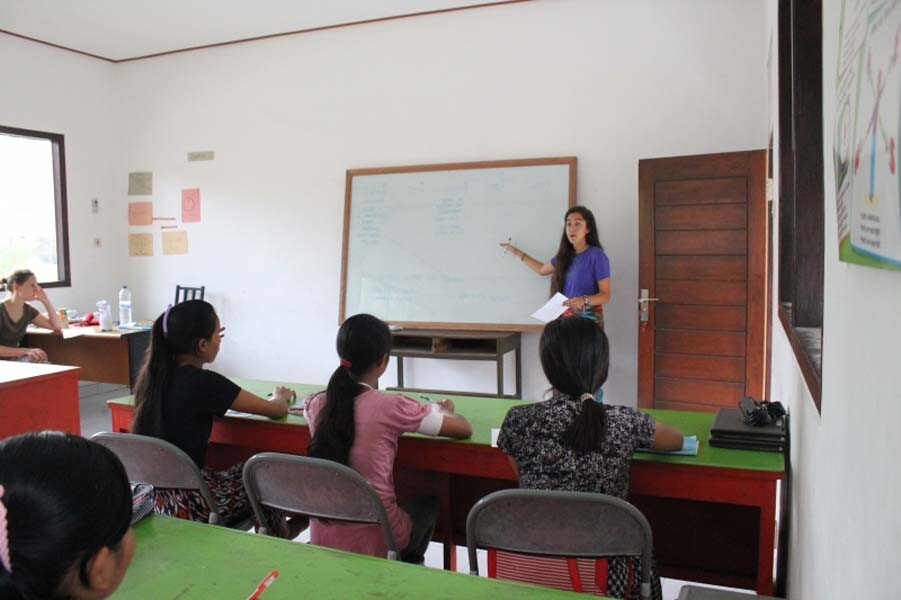
by Gabriela Aleman
I have been so immersed in the present during the past two months here in Tianyar that many thoughts about my old life and responsibilities have kind of… vanished.
I can’t say that I expected to be so in love with what I’m doing and where I am: My attachment to this place has grown so strong that to think of the two months I have left gives me a twinge of anxiety.
It doesn’t feel like enough time.
My time here has consisted of much more than teaching, but let me focus on that first. I teach three classes a day: Two classes consist of 16-18 year olds, and the other one consists of 13-14 year olds.
At first, teaching the older age group was intimidating—they’re all my age—but within the first two weeks I grew into the swing of it. I usually start class with a warm up question or two in order to get them to write. Even though their English is relatively basic, I challenge them with thought provoking questions that help them expand their vocabulary. It’s also fascinating to see their perspective compared to mine.
Sometimes I forget that these kids have grown up half way across the world from me.
Some of the biggest differences I’ve seen between their answers and mine probably arose when I asked them to write a 10 item bucket list. While many of my examples were focused on myself and goals I want to achieve, such as backpacking through Europe or learning how to play guitar, all of them answered with things like “I want to become successful in order to help my family” or “To provide my parents with a more comfortable lifestyle” or “play in the snow!” The last one I totally understood, but it was a surprise to me how family-oriented they are, much more so it seems than people in the western world.
And it’s not that people in the western world aren’t family-oriented, but when a child goes off to college it sort of defines the point in their life when they begin their independence, but it’s not like that here.
For example, the village I live in basically consists of an intricate network of brothers and sisters, aunts and uncles, and plenty of cousins. The founder of the school is the eighth child in his family; many of his siblings live in the area and have kids that come to the school. Every day when I walk around I see someone or other’s family member. It’s pretty fun to have so many connections, though how they keep from getting confused goes beyond me.
Fun fact about the Balinese—their first name is always one of ten names, which are assigned to each child depending on the order in which they are born. The first born is either Wayan, Putu, Gede, or Iluh; second is Made, Kadek, Nengah; third is Komang or Nyoman, and the fourth is always Ketut. If you have more than four children, you just start all over again.
So the founder of the school is named Ketut, because he’s the eighth child. The names are also not gender specific except for Gede (male) and Iluh (female); their gender is determined by putting either “I” for males or “Ni” for females in front of the name. For example, my students named me “Ni Komang” because I’m a girl and the third born within my family.
Because all Balinese people have one of ten names, they usually go by a second or third name or even nickname. And hey, if I ever forget someone’s name, I’ve got a pretty good chance of guessing the correct one!
But to focus back on the teaching, I really do enjoy it. I wish I had more experience because then I’d be able to be more effective, but I do feel like I’m making a difference.
My students range from all types of English comprehension; some can have full on conversations while others can only make simple sentences. This makes teaching a little difficult because if I focus too much on the simple things, the more advanced students get bored, and if I do things that are too challenging, the others are lost. It’s all about creating lessons that are engaging and interactive and finding a balance. I used to think that teaching English was considered “voluntourism” and I was nervous about coming here because I didn’t want to fall into that category. But the children at this school really do benefit from all the volunteers that come through. Because Bali relies so heavily on the tourism industry, learning English can give these children a brighter future.



